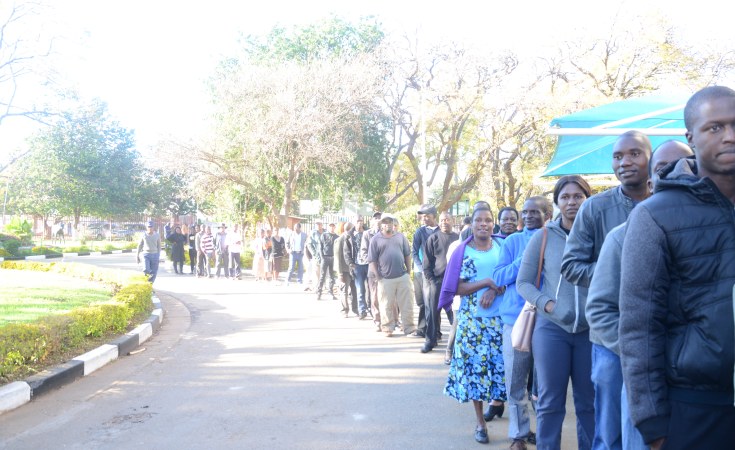Zimbabwe has failed to establish an environment in which its forthcoming general election will meet international standards for a free and fair electoral process, says a new report from New York-based Human Rights Watch.
The 44-page report, entitled "'Crush Them Like Lice': Repression of Civil and Political Rights Ahead of Zimbabwe's August 2023 Election," opens with the following summary:
"Right now, we cannot hold meetings in towns and cities, and we cannot go to the rural areas. [The ruling party] ZANU-PF declared that rural areas are no-go zones for the opposition, and the ruling party causes violence any time the opposition tries to venture into the rural areas." – Ostallos Siziba, opposition spokesperson, Harare, April 2023
On August 23, 2023, Zimbabweans will go to the polls to vote for the president of the country and members of the parliament (MPs). Of the 11 candidates currently running for president, there are two clear frontrunners: President Emmerson Mnangagwa of the ruling Zimbabwe African National Unity-Patriotic Front (ZANU-PF) party, and Nelson Chamisa of the main opposition party, the Citizens Coalition for Change (CCC).
Human Rights Watch spent two weeks in Zimbabwe in April and May 2023. Twenty-eight (28) people were interviewed, including representatives from the main opposition party, election observer groups, lawyers, human rights activists, and ordinary citizens. These people provided first-hand accounts on electoral conditions in the country ahead of the August 23, 2023, elections.
Human Rights Watch's research found that rights critical for Zimbabwe's election, such as to freedom of expression, association, and assembly, are imperiled. Violence, intimidation, harassment, and repression linked to ZANU-PF and aimed principally at CCC members and civil society activists have restricted civic and political space. The environment for a credible, free, and fair election has been grossly diminished.
Cases of abductions, arbitrary arrests of political opposition figures, critics of the government, and other human rights abuses by ZANU-PF supporters and state security officials have operated to advance ZANU-PF's electoral interests.
The authorities have weaponized the criminal justice system against the ruling party's political opponents. CCC politicians have been held in prolonged pre-trial detention or convicted on baseless, seemingly politically motivated charges.
Further, the Zimbabwean authorities have greatly limited the space for opposition parties to campaign. Through various means, they have restricted the rights to freedom of expression, movement, and association, leaving the opposition unable to stage rallies, mobilize, campaign, and associate with supporters. ZANU-PF has ensured that the playing field is skewed, with the Zimbabwe Republic Police persistently refusing to issue permits to the opposition to hold campaign rallies while allowing ZANU-PF to meet without hindrance.
The actions against CCC members and supporters by government authorities contravene basic rights guaranteed under the Constitution of Zimbabwe. They also violate rights to freedom of expression, movement, association, and peaceful assembly protected under the International Covenant on Civil and Political Rights,[1] the African Charter on Human and Peoples' Rights,[2] and other international human rights treaties to which Zimbabwe is a party.
Crucial for addressing electoral rights is an independent and impartial national election commission. However, there are serious concerns about the independence, composition, and conduct of the Zimbabwe Electoral Commission (ZEC). Past elections were widely perceived as problematic largely because the ZEC has been closely aligned with the interests of the ruling party. The management of the ZEC secretariat remains in the hands of people widely believed to be ZANU-PF sympathizers. These individuals, many of whom have ties to the country's military, police, and intelligence services, supervised previous deeply flawed electoral processes.
The government has sought to enact repressive laws ahead of the August election, most notably an amendment to the Private Voluntary Organizations (PVO) Act. On July 14, 2023, President Emmerson Mnangagwa signed into law the Criminal Law Codification and Reform Amendment Bill 2022, commonly referred to as the "Patriotic Bill." The law empowers the National Prosecuting Authority to prosecute anyone it considers to be undermining the country or using false statements to paint a negative picture of the country to foreign governments. Opposition politicians, civil society activists, and government critics have expressed strong fears that the authorities will use these laws to criminalize their activities.
Ahead of the general election, there is little evidence to indicate that the Zimbabwean government is ready to meet its obligations under national, regional, and international law and standards to allow people to freely vote for candidates of their choice in an environment free of intimidation, fear, and violence.
The credibility of the election will be measured against the standards set out in the African Union's (AU) African Charter on Democracy, Elections and Governance and the Southern African Development Community's (SADC) Principles and Guidelines Governing Democratic Elections. Under the two documents, member states are to observe and respect the full participation of citizens in the political process; freedom of expression and association; political tolerance; equal opportunity for all political parties to access the state media; independence of the judiciary; independence of the media; impartiality of the electoral institutions; and voter education.
The restrictive environment in Zimbabwe falls short of these standards. As Zimbabweans prepare for the August election, the authorities should ensure they have the opportunity to exercise their fundamental rights to freely vote for individuals and parties of their choice. The authorities should end all improper and unlawful interference in the election-related activities guaranteed by domestic, regional, and international human rights law and standards.


